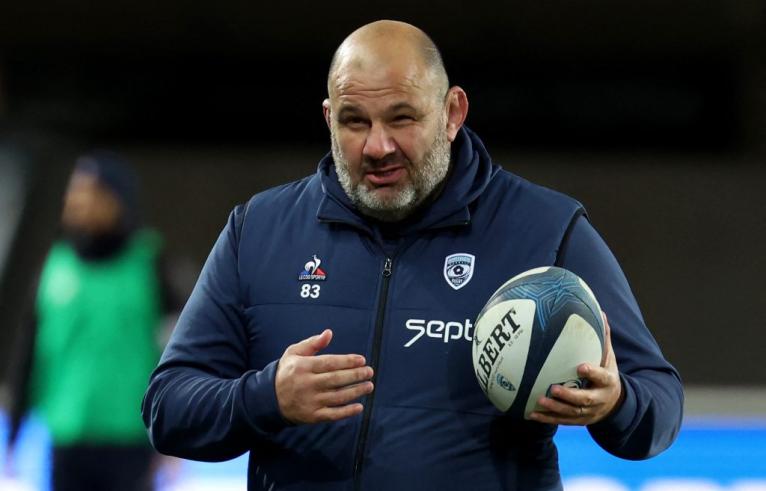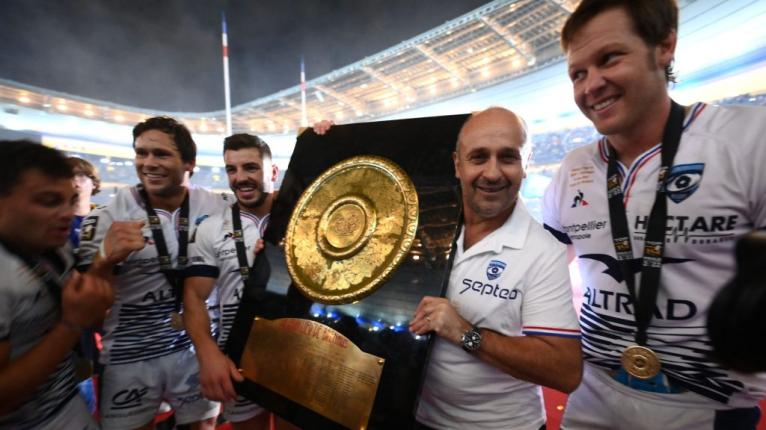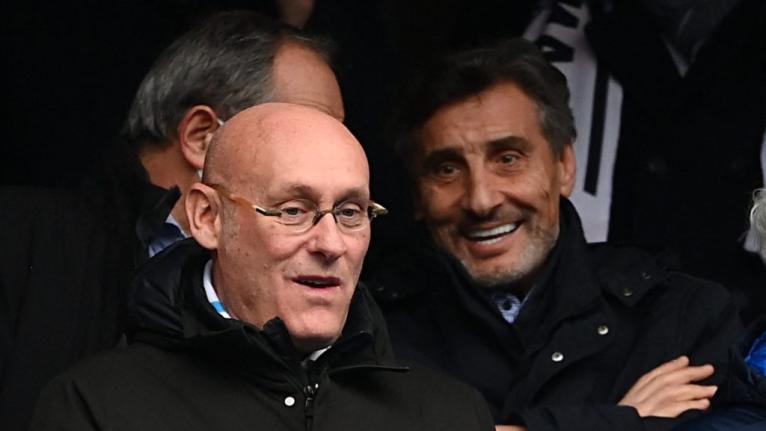I don’t want to say ‘I told you so’, but, well, ‘I told you so’. When Montpellier unveiled Patrice Collazo as their new head coach last November I predicted it wouldn’t go well. He is, I ventured, French rugby’s answer to English football’s Sam Allardyce: a man big in build but short in strategy.
Montpellier were bottom of the Top 14 when Collazo was hired to replace Richard Cockerill. He acknowledged the size of his task but told the media he was up for the challenge. Six months on and Montpellier are second from bottom; strictly-speaking then, Collazo has had a positive effect on the Mediterranean club, but 13th instead of 14th is probably not what club owner Mohed Altrad had in mind when he made the appointment.
The last time Montpellier won a Top 14 match was on 9th March, a dour and nervy 10-3 victory over visitors Bayonne. They have since lost every game: away defeats by Pau and Toulon, the latter a 54-7 shellacking, as well as home fixtures to Stade Francais and Perpignan.

The last of those losses, a local derby, was particularly humiliating. Perpignan brought around 4,000 fans to the GGL stadium, despite the fact their official ticket allocation was 625. In the build-up to the match Altrad had refused to increase the number of tickets for the Catalan club, declaring the ‘Perpignan public mustn’t invade us…It’s still Montpellier’s stadium, it’s not Aimé-Giral [the Perpignan ground].’ But the Perpignan fans got hold of tickets and the noise they generated made it feel their boys were playing at home.
It was a chastening experience for Altrad, second-best on and off the pitch. But he has only himself to blame. Two years ago it seemed the business tycoon had achieved his ambition of transforming Montpellier into a powerhouse. Having bought the club in 2011 for €2.4m, Altrad saw little return on his investment in the first decade; Montpellier reached two Top 14 finals but lost both, and the club’s only silverware was the European Challenge Cup in 2016 and 2021.
The 2021 victory was masterminded by Philippe Saint-Andre, who was hired as director of rugby by Altrad in March 2020. The head coach was Xavier Garbajosa, the former France back, who had been in his post since 2019, replacing the experienced Vern Cotter. He in turn had succeeded Jake White in 2017.
Seventy per cent of the squad don’t speak my language, and the guys who’ve been here for two years can barely speak two words of French.
Between them, the South African White and New Zealander Cotter had turned Montpellier into a club without any strong identity. It was too much for some. Charles Géli, the club’s French hooker, complained to Midi Olympique. “Seventy per cent of the squad don’t speak my language, and the guys who’ve been here for two years can barely speak two words of French. I should have gone and played abroad, at least then I would have known it was up to me to adapt!”
The point was accepted by Altrad. More Frenchmen and fewer South Africans were signed, key among them Guilhem Guirado, who arrived from Toulon at the start of the 2019-20 season. A Top 14 winner with Perpignan, and a Champions Cup winner with Toulon, the then 33-year-old brought experience, desire and pride to Montpellier. It rubbed off on the younger French members of the squad, such as Anthony Bouthier, Yacouba Camara, Arthur Vincent and Mohamed Haouas.
The change from the Anglophone era to a French one took time, and the callow Garbajosa wasn’t the right coach to take Montpellier on its transformative journey. “He arrived with an ambitious, very expansive game plan but it didn’t catch on because he still had the squad of the previous coaches, who played a more closed game,” reflected Julien Tomas, the former Montpellier scrum-half who was on the club’s coaching staff from 2018-2020.

Saint-Andre had allowed Garbajosa time to try and develop his game plan but ultimately it was Altrad who made the decision to relieve him of his duties in January 2021. “The potential is there, the team is good, but I don’t see a system of play,” he said. “When I go to training sessions, I don’t always understand what’s going on.”
Saint-Andre and his new coaching team of Jean-Baptiste Elissalde and Olivier Azam were in charge for the 2021-22 season, and among the new faces in the squad were three who would exert a significant influence: the veteran French centre Geoffrey Doumayrou, the Italian fly-half Paolo Garbisi and English number eight Zach Mercer.
Saint-Andre’s strength has always been spotting which players are the right fit for his teams; he did at Toulon, where he recruited, among others, Jonny Wilkinson and Bakkies Botha, when many commentators believed injuries had got the better of them. He signed Mercer because he believed his game was suited to the Top 14.
He was right. Mercer was the physical force in a Montpellier team which won the 2022 Top 14 title, complementing the emotional force brought by Guilhem Guirado. On the eve of the final against Castres, the French newspaper Le Monde profiled Montpellier under the headline: “A former ‘club of mercenaries’, Montpellier has reinvented itself.”.
As Toulouse have shown in the professional era with their total of two coaches, continuity creates the ecosystem for success.
Among those who contributed to the article was Thomas, who had played for the club in the pre-Altrad era. He rejoiced ‘the club has rediscovered its DNA’. The former France international turned pundit Maxime Mermoz said: “When I look at the squad, I see a team full of leaders and that’s a change from the past. Someone like Guirado isn’t going to do a lot of talking, but he’s going to set an example.”
Montpellier didn’t rest long on the summit of French rugby. Guirado retired, Vincent missed the whole of the next season with injury and the squad was unsettled by off-field controversies, notably the arrest of Haouas for domestic violence and the trial and conviction for corruption of Altrad in a case which made headlines around the world.
Altrad received a suspended sentence, as did his co-accused, Bernard Laporte, although he was forced to resign as president of the FFR. ‘Crazy Bernie’ didn’t remain long on the naughty step; Altrad chose him as the man to replace Saint-Andre as Montpellier’s director of rugby.
So far he hasn’t been a success. Nor has Collazo.
Back in November I said it would be a surprise if Collazo saw out his 18-month contract. If Montpellier are forced to endure the indignity of playing the runners-up of the ProD2 in a relegation play-off (Oyonnax look nailed on for automatic relegation) it’s hard to see how Altrad could justify retaining Collazo. That would entail a new head coach, the eighth in Altrad’s thirteen seasons of ownership.
As Toulouse have shown in the professional era with their total of two coaches, continuity creates the ecosystem for success. It is the same in football, as Sir Alex Ferguson demonstrated with Manchester United and Pep Guardiola has done at Manchester City.

Altrad became a billionaire after founding a scaffolding company in the 1980s, and in 2015 he was named World Entrepreneur of the Year. Asked by the BBC for the secret of his business success, Altrad replied: “A company is an identity, a piece of history… the general tendency of big groups like us is to reshape [the companies they take over] and make them more or less standard. This is absolutely against my concept.”
His concept, he explained, is to keep the identity of his companies he buys so the workforce still feels a loyalty.
This is not a principle he applies to his rugby club. During Altrad’s time in charge he has reshaped Montpellier countless times, hiring and firing coaches and showing little consideration for the team’s identity.
Perhaps what Montpellier really needs isn’t a new coach but a new owner.



Comments
Join free and tell us what you really think!
Sign up for free